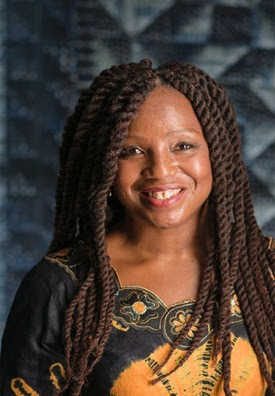….as Achebe’s daughter, Nwando, named among 46 fellows.
Chinua Achebe’s academic light has shun globally on a second child of his, Nwando, just a week after her brother Chidi won the John and Samuel Bard Award in the United States for excellence in medicine and science.
Both Chidi and Nwando are professors, as their famous father was before his death in 2013 at 82 after decades of literary prowess with titles such as Things Fall Apart and The Trouble With Nigeria,among others, that blessed readers worldwide.
Their mother Christie is a professor of education.
Chidi is a professor of medicine, Nwando a professor of history. They both live in the United States where their father spent the last 13 years of his life.
Nwando – the Jack and Margaret Sweet Endowed Professor of History, and associate dean for diversity, equity, and inclusion for the College of Social Science at Michigan State University (MSU) – has been named one of 46 American Council on Education (ACE) Fellows for academic year 2022-23.
She was selected following a rigorous review.
“Dr. Achebe is a dynamic leader and accomplished scholar. She has done incredible work toward the advancement of diversity, equity and inclusion in our college, university and beyond,” said Mary Finn, dean of MSU College of Social Science.
“We are thrilled that she is receiving this fellowship and cannot wait to see what she does next.”
Achebe said: “It is an absolute privilege to have been named an ACE 2022-23 fellow. ACE’s immersive learning design will provide me with an unbridled opportunity to advance my commitment to institutional building and equitable change.
“I expect to emerge more connected, and with broader knowledge to become a greater asset to MSU.”
Nwando Achebe’s biography
Nwando, 52, was born in Enugu on 7 March 1970 to Chinua Achebe, and Christie Achebe, a professor of education. She is married to Folu Ogundimu, a professor of journalism at MSU. They have a daughter, Chino.
She is a Nigerian-American academic, feminist scholar, and multi-award-winning historian.
She is the Jack and Margaret Sweet Endowed Professor of History and the Associate Dean for Diversity, Equity, and Inclusion in the College of Social Science at MSU.
She is also founding Editor-in-Chief of the Journal of West African History, according to Wikipedia.
Education and career
Nwando received her PhD in African History from the University of California, Los Angeles in 2000. An oral historian by training, her areas of expertise are West African History, women, gender, and sexuality histories.
In 1996 and 1998, she served as a Ford Foundation and Fulbright-Hays Scholar-in-Residence at the Institute of African Studies and the Department of History and International Studies at the University of Nigeria, Nsukka.
Her first academic position was as an Assistant Professor of History at the College of William and Mary.
She then moved to MSU in 2005 as a tenured Associate Professor, Professor in 2010, and is currently the Jack and Margaret Sweet Endowed Professor.
Scholarship
She has published seven books:
Farmers, Traders, Warriors, and Kings: Female Power and Authority in Northern Igboland, 1900-1960
The Female King of Colonial Nigeria: Ahebi Ugbabe
History of West Africa E-Course Book
Women and Gender in Africa
A Companion to African History
Holding the World Together: African Women in Changing Perspective
Female Monarchs and Merchant Queens in Africa.
ACE Fellows Program
The ACE Fellows Program was established in 1965 to strengthen institutions and leadership in US higher education by identifying and preparing faculty and staff for senior positions in college and university administration through its distinctive and intensive nominator-driven, cohort-based mentorship model.
About 2,500 higher education leaders have participated in the ACE Fellows Program over the past five decades, with more than 80 per cent of fellows having gone on to serve as senior leaders of colleges and universities.
“The ACE Fellows Program embodies ACE’s goal of enriching the capacity of agile leaders to problem-solve and innovate, and it fuels the expansion of a talented and diverse higher education leadership pipeline,” said ACE President Ted Mitchell.
“Fellows continue to excel in prominent leadership roles, and the potential of this new cohort to bring strong leadership to institutions across America greatly excites me.”
The program combines retreats, interactive learning opportunities, visits to campuses and other higher education-related organizations, and placement at another higher education institution to condense years of on-the-job experience and skills development into a single year.
During the placement, fellows observe and work with the president and other senior officers at their host institution, attend decision-making meetings and focus on issues of interest.
Fellows also conduct projects of pressing concern for their home institution and seek to implement their findings upon completion of the fellowship placement.
At the conclusion of the fellowship year, fellows return to their home institution with new knowledge and skills that contribute to capacity-building efforts, along with a network of peers across the US and abroad.





